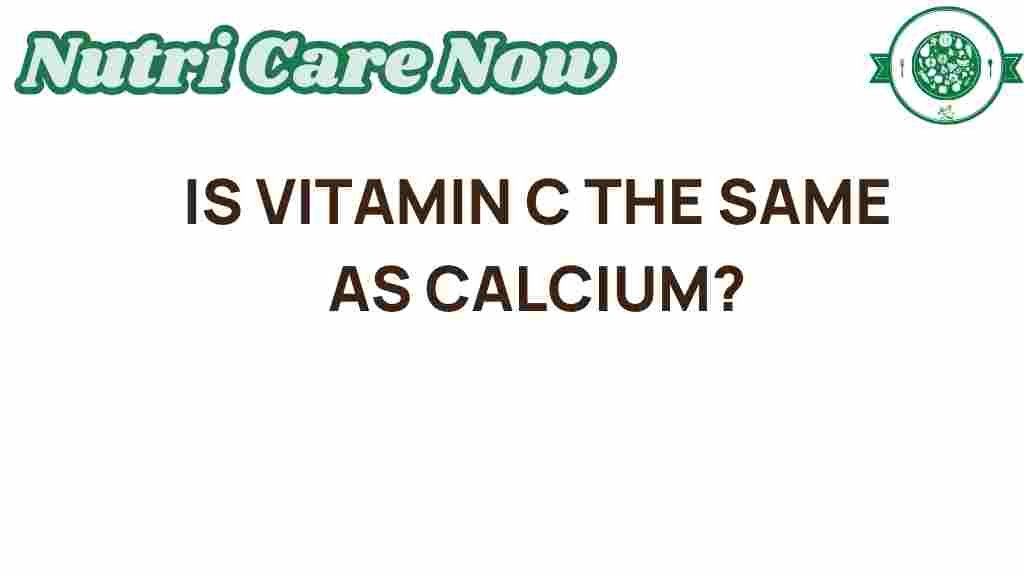The Surprising Differences: Is Vitamin C the Same as Calcium?
When it comes to maintaining our health, understanding the role of various nutrients is essential. Among the many vitamins and minerals, Vitamin C and Calcium are two that often come up in discussions about diet and supplements. However, despite their importance, they serve very different purposes in the body. In this article, we will explore the surprising differences between Vitamin C and Calcium, their roles in our health, and how to ensure we meet our dietary needs.
Understanding Vitamin C and Calcium
Before diving into the differences, let’s clarify what Vitamin C and Calcium are, and why they are vital for our health.
What is Vitamin C?
Vitamin C, also known as ascorbic acid, is a water-soluble vitamin that plays a crucial role in several bodily functions. It is known for its antioxidant properties, helping to combat free radicals in the body. Key functions of Vitamin C include:
- Boosting the immune system
- Promoting wound healing
- Enhancing iron absorption from plant-based foods
- Supporting skin health and collagen production
What is Calcium?
Calcium is a mineral that is essential for numerous bodily functions, primarily known for its role in maintaining strong bones and teeth. Additionally, Calcium is involved in:
- Muscle contraction
- Nerve transmission
- Blood clotting
- Regulating heart rhythms
The Key Differences Between Vitamin C and Calcium
Now that we have a basic understanding of both Vitamin C and Calcium, let’s explore their key differences.
1. Chemical Composition
Vitamin C is an organic compound, while Calcium is a mineral. This fundamental difference means they interact with the body in distinct ways. Vitamin C is found in various fruits and vegetables, while Calcium is primarily sourced from dairy products, leafy greens, and fortified foods.
2. Function in the Body
The functions of these two nutrients differ significantly:
- Vitamin C: Primarily involved in antioxidant activity and immune support.
- Calcium: Crucial for bone health and muscle function.
3. Sources
While both nutrients can be obtained through a well-balanced diet, their sources differ:
- Vitamin C sources: Citrus fruits, strawberries, kiwi, bell peppers, and broccoli.
- Calcium sources: Milk, cheese, yogurt, almonds, and fortified plant-based milk.
4. Deficiency Symptoms
Deficiencies in these nutrients can lead to different health issues:
- Vitamin C deficiency: Can cause scurvy, characterized by fatigue, gum disease, and skin problems.
- Calcium deficiency: May lead to osteoporosis, muscle cramps, and dental issues.
How to Incorporate Vitamin C and Calcium into Your Diet
Meeting your dietary needs for Vitamin C and Calcium can be easily achieved through various supplements and food choices. Here’s a step-by-step guide:
Step 1: Assess Your Current Diet
Take a look at your daily meals. Are you consuming enough fruits and vegetables for Vitamin C? Are you getting sufficient dairy or dairy alternatives for Calcium? Keeping a food journal can help identify gaps.
Step 2: Plan Balanced Meals
Ensure each meal includes a source of Vitamin C and Calcium:
- Breakfast: Yogurt with strawberries
- Lunch: Spinach salad with citrus dressing
- Dinner: Grilled salmon with steamed broccoli
Step 3: Consider Supplements
If you struggle to meet your dietary needs through food alone, consider discussing supplements with your healthcare provider. Both Vitamin C and Calcium supplements are widely available.
Step 4: Monitor Your Intake
Keep track of your Vitamin C and Calcium intake to ensure you’re hitting the recommended daily allowances:
- Vitamin C: 75 mg for women and 90 mg for men
- Calcium: 1,000 mg for adults up to age 50, 1,200 mg for older adults
Troubleshooting Tips
If you find it challenging to meet your requirements for Vitamin C and Calcium, consider the following tips:
- Experiment with Recipes: Find creative ways to incorporate more fruits and vegetables into your meals.
- Choose Fortified Foods: Look for cereals and plant-based milks that are fortified with Calcium.
- Stay Consistent: Make it a habit to include a source of Vitamin C and Calcium in every meal.
Conclusion
In conclusion, while both Vitamin C and Calcium are essential for our health, they serve different functions and come from different sources. Understanding these differences helps you make informed choices about your diet and supplements. Always consult with a healthcare professional for personalized advice on meeting your dietary needs.
For further reading on vitamins and minerals, you can check out this resource on vitamin and mineral needs. Additionally, for tips on healthy eating, visit this website.
This article is in the category Health and created by NutriCareNow Team

3 thoughts on “The Surprising Differences: Is Vitamin C the Same as Calcium?”